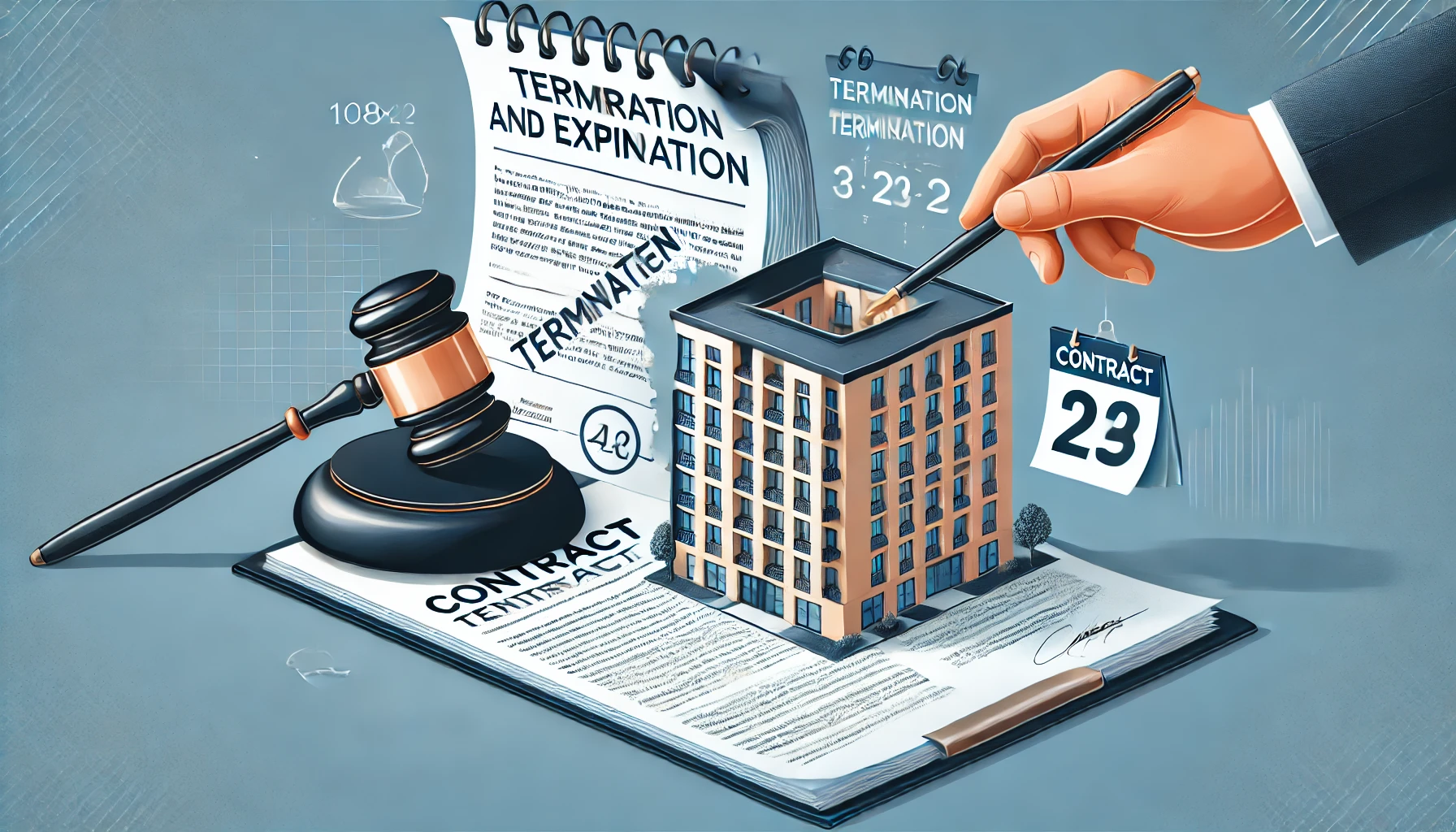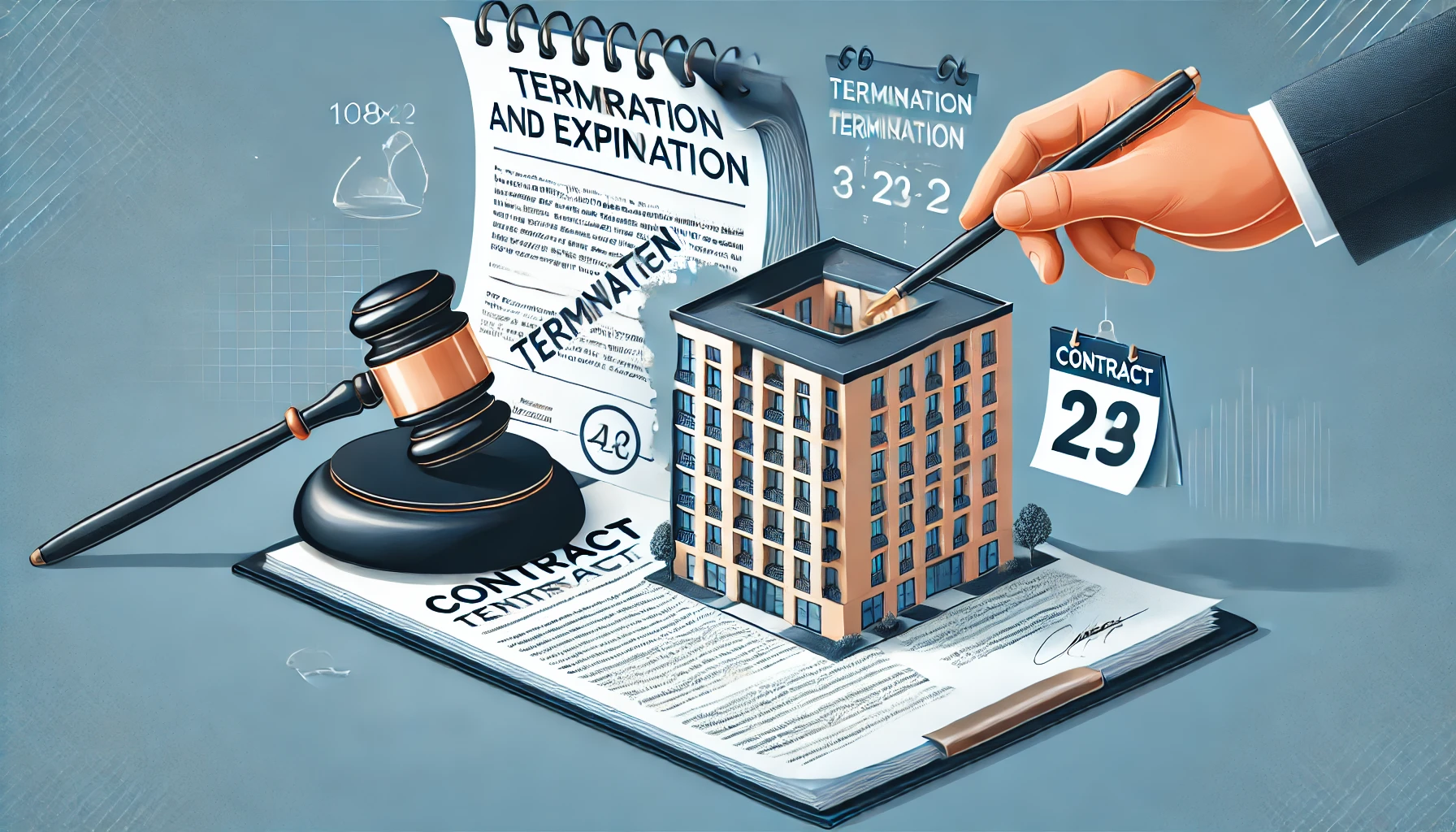In the real estate market, a precise understanding of the concepts of contract termination and contract expiry, particularly in apartment agreements, is of great importance. The termination of an apartment contract and its expiry each have different legal conditions and consequences, and a lack of awareness of these can lead to legal and financial issues. This article examines the rights related to the termination of apartment contracts, the conditions for terminating property agreements, and how to conclude an apartment contract according to the laws. It also explores the duration of apartment contracts and the implications of contract expiry.

This article, prepared by the Research and Development Unit of Fepco (Saman Mechanic Farayand Energy Pars), aims to provide accurate and practical information. It seeks to familiarize readers with the differences between contract termination and contract expiry in the context of apartment agreements and offers legal and practical solutions for managing the conclusion of apartment contracts.
Legal Differences Between Contract Termination and Expiry in Apartment Contracts:
1.Concept of Contract Termination:
Contract termination refers to ending the contract before the agreed-upon date, as initiated by one or both parties. Termination typically occurs due to one party’s failure to fulfill their obligations or the occurrence of specific conditions outlined in the contract. Upon termination, the contract is reverted to its pre-contract state, and the parties are no longer bound by the obligations they had undertaken.

2. Concept of Contract Expiry:
Contract expiry means the natural conclusion of the contract on a specified date or after the fulfillment of certain conditions mentioned in the contract. In expiry, all obligations of the parties end either at the predetermined date or upon the occurrence of specified conditions. Unlike contract termination, expiry is not a breach or violation of the contract but a natural and mutual conclusion.
3.Conditions for Occurrence:
– Contract Termination: Termination usually occurs due to non-performance by one of the parties or an external factor, such as force majeure, which makes contract performance impossible. Termination may be requested by one party and, in some cases, may require court approval.
– Contract Expiry: Expiry occurs automatically based on the time or conditions pre-established in the contract. This conclusion does not require any specific action by the parties and usually happens automatically.
4.Legal Consequences:
– Contract Termination: Upon termination, one party may be required to compensate the other for damages or losses. There may also be obligations to refund payments or return received benefits.
– Contract Expiry: In contract expiry, all obligations and rights naturally conclude, and generally, there is no obligation to compensate unless a specific condition is mentioned in the contract.
5.Reversal Effect:
– Contract Termination: Termination usually leads to the parties being restored to their pre-contract status, meaning everything provided or received under the contract must be returned.
– Contract Expiry: In expiry, there is no reversal to the previous state; only new obligations cease to exist.

6.Legal Process:
– Contract Termination: May require legal procedures, including court requests or arbitration.
– Contract Expiry: A self-executing process based on time or agreed conditions, usually requiring no legal intervention.
These legal differences are crucial in managing apartment contracts, and being aware of them can help parties enter contracts with greater confidence and take appropriate actions when necessary.
Major Conditions Leading to the Termination of an Apartment Contract and Their Impact on the Contracting Parties:
1.Failure to Fulfill Obligations by One Party:
– Conditions: If one party fails to meet their contractual obligations, such as the tenant failing to pay rent or the landlord not carrying out necessary repairs, the other party may request contract termination.
– Impacts: In this case, the breaching party may be required to compensate the other party. For example, if the tenant does not pay rent, the landlord may seek both contract termination and damages. This situation can lead to legal disputes between the parties.

2.Presence of a Major Defect or Flaw in the Property:
– Conditions: If the apartment has a significant defect or flaw that makes it impossible or extremely difficult to use, the tenant may terminate the contract. These defects might include structural issues, health, or safety concerns.
– Impacts: In such cases, the landlord may be required to return the rent received and compensate the tenant for any damages. This could lead to legal disputes, especially if the landlord was aware of the defects but failed to address them.
3.Force Majeure (Act of God):
– Conditions: Unforeseen events beyond the control of the parties, such as earthquakes, floods, or wars, that make the contract’s execution impossible, may lead to termination.
– Impacts: In this scenario, neither party is typically held liable to the other, and all financial or non-financial obligations under the contract are terminated. This situation can reduce legal obligations and conflicts.
4.Mutual Agreement to Terminate the Contract:
– Conditions: In some cases, the parties may mutually agree to terminate the contract, possibly due to changes in financial or personal circumstances of one of the parties.
– Impacts: In such cases, the conditions for contract termination are specified in the agreement between the parties and are usually carried out without legal disputes. This approach can help maintain amicable relations between the parties.
5.Non-Conformity of the Property with Contract Terms:
– Conditions: If it is discovered that the rented or purchased property does not match the conditions and features specified in the contract, the other party may request contract termination.
– Impacts: In this case, the other party may request a refund and compensation for damages. This situation can lead to legal disputes and financial tensions.
6.Changes in Legal Conditions or Regulations:
– Conditions: Changes in laws or regulations that make contract execution impossible or illegal can also result in contract termination.
– Impacts: These conditions may affect the financial obligations of the parties and lead to legal issues. In some cases, new laws may require the parties to fulfill new obligations or modify contract conditions.
7.Inability of One Party to Continue the Contract:
– Conditions: If one party is unable to continue fulfilling the contract due to death, bankruptcy, or financial incapacity, this may lead to contract termination.
– Impacts: In such cases, the other party may request compensation, but depending on the specific circumstances, the contract may be terminated without additional liability for the other party.
8.Failure to Obtain Necessary Permits:
– Conditions: If it is found that the property lacks the necessary permits for the intended use, such as a commercial permit for using the apartment as an office, the parties can terminate the contract.
– Impacts: This could lead to a refund of payments and even a request for damages by the other party, possibly resulting in prolonged legal disputes.
9.Violation of Tenant’s Privacy or Peace:
– Conditions: If the landlord or another party infringes on the tenant’s rights or privacy, such as unauthorized entry into the property, the tenant may terminate the contract.
– Impacts: This violation could lead to legal disputes, and the landlord may be required to pay fines or compensate the tenant.
10.Unacceptable Delay in Property Handover:
– Conditions: If the landlord cannot deliver the property to the tenant on the agreed date and the delay is unacceptable, the tenant may terminate the contract.
– Impacts: In this scenario, the tenant may request a refund and compensation from the landlord, which could lead to legal disputes.
Overall, the conditions for terminating an apartment contract can vary depending on the type of contract and specific circumstances. The impact of this termination on the parties depends on various factors, including the obligations stipulated in the contract, local laws, and court decisions. Awareness of these conditions and their impacts is crucial for both parties to enter into contracts with confidence and take appropriate action if problems arise.
Conclusion
This article, prepared by the Research and Development Unit of Fepco (Saman Mechanic Farayand Energy Pars), aimed to provide a comprehensive examination of the fundamental differences between contract termination and contract expiry in the context of apartment contracts. This analysis is intended to enhance public and legal awareness regarding the proper management of the conclusion of apartment contracts and other real estate agreements.
Termination and expiry of an apartment contract each have their unique characteristics and consequences. Termination usually occurs due to non-performance by one of the parties or specific conditions stipulated in the contract and can lead to legal disputes and damages. In contrast, contract expiry refers to the natural and mutual conclusion of the contract after the contract period ends or specified conditions are met. Despite their apparent similarities, these two concepts have different legal and financial impacts on the contracting parties, which must be carefully considered.
The examination of the differences between contract termination and expiry in apartment contracts highlighted the importance of real estate laws and contract law in determining the conditions and methods for concluding an apartment contract. The rights to terminate an apartment contract and the conditions for terminating a property contract were key topics analyzed in this discussion. Legal considerations related to the termination of apartment lease contracts and the duration of apartment contracts were also carefully examined to clarify how an apartment contract ends and its impact on the rights and obligations of the parties.
Given that real estate laws and regulations play a crucial role in the formation and execution of apartment contracts, awareness of the conditions for termination and expiry of contracts is essential for all parties involved in apartment agreements. This awareness can help prevent legal disputes and facilitate the proper management of the conclusion of apartment contracts according to the law.
Ultimately, this article helps Fepco (Saman Mechanic Farayand Energy Pars) gain a better understanding of the legal conditions related to contract termination and expiry, enabling the company to develop appropriate strategies for managing its real estate contracts. Additionally, the use of relevant keywords and phrases in this research enhances the SEO content of the company’s website, improving its ranking in search engines.
Frequently Asked Questions
1.What is the main difference between contract termination and contract expiry in apartment contracts?
Termination refers to ending the contract before the scheduled time due to a breach of obligations or specific conditions. In contrast, expiry refers to the natural conclusion of the contract after the stipulated period ends or specified conditions are met. In termination, there may be a need for restitution and damages, while expiry generally concludes naturally without additional liability.
2.Under what conditions can an apartment contract be terminated?
An apartment contract can be terminated under conditions such as non-payment of rent, failure of one party to fulfill obligations, the presence of a significant defect in the property, or violation of the tenant’s privacy. Specific conditions mentioned in the contract may also lead to termination.
3.Does terminating an apartment contract require going to court?
In some cases, terminating an apartment contract may require going to court, especially if one party disagrees with the termination or there are serious financial or legal disputes. In some situations, termination can be agreed upon by the parties without court intervention.
4.What does contract expiry mean, and what are its consequences?
Contract expiry means the natural conclusion of the contract after the stipulated period ends or specified conditions are met. After expiry, the obligations of the parties end, and there is usually no need for restitution or damages unless otherwise specified in the contract.
5.When does an apartment contract automatically expire?
An apartment contract automatically expires at the end of the period specified in the contract or after the occurrence of conditions outlined in the contract. This expiry does not require any specific action from the parties and occurs naturally.
6.Can an apartment contract be extended after it expires?
Yes, after an apartment contract expires, the parties can mutually agree to extend it. This extension may be under new terms or the same conditions as before, requiring either a new contract or an addendum to the existing one.
7.Does the tenant have to vacate the property immediately upon termination of the apartment contract?
This depends on the contract’s terms and the reason for termination. In some cases, the tenant may be required to vacate immediately, but in others, they may be given time to do so. This is usually specified in the contract or determined by the court.
8.What are the legal consequences of terminating an apartment contract?
If an apartment contract is terminated, the party responsible for the termination may be required to compensate the other party. Restitution of payments or compensation for damages may also be legal consequences.
9.Can a tenant terminate the contract before the end of the lease term?
Yes, a tenant can terminate the contract before the end of the lease term, but this usually requires the landlord’s consent or justified reasons for termination, such as a breach of obligations by the landlord. Otherwise, the tenant may be liable for damages or financial obligations.
10.How does the end of an apartment contract occur according to the law?
The end of an apartment contract according to the law occurs naturally at the end of the contract period or after the conditions outlined in the contract are met. The parties must adhere to their obligations until the contract concludes, after which the contract automatically or by mutual agreement concludes.



